Gorgeous (1999)
Directed by: Vincent Kok
Written by: Ivy Ho, Jackie Chan, Vincent Kok, Yiu Fai Lo
Starring: Bradley Allan, Jackie Chan, Shu Qi, Tony Leung
AKA BOH LEI CHUN
HONG KONG
AVAILABLE ON BLU-RAY, DVD and DIGITAL
RUNNIMG TIME: 120 mins / 100 mins
REVIEWED BY: Dr Lenera
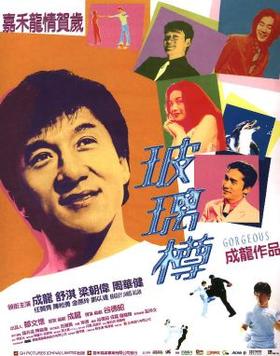
In the small Taiwanese village of Jibei, the “island of love”, lives Bu, innocent and full of romantic dreams. One day she looks into the sea and sees a bottle which contains the message “Do you know I’m waiting for you”? She heads for Hong Kong to fund its writer, only to discover that it was in fact a gay makeup artist called Albert, written for his ex. While attending some of Albert’s photoshoot on a yacht, she sees wealthy recycling company owner Chi Ng being attacked by men belonging to his lifelong rival L. N. Lo, who’s found out that Chi Ng has not just been dating his girlfriend but is trying to buy his company. Bu’s quick to the rescue, and immediately falls in love. She’s willing to go to underhand methods to get the man she has her sights on, while Lo also wants to get Chan in a different way and thinks up a plan….
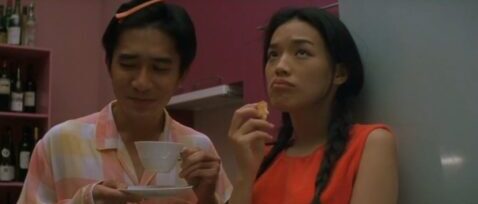
Made during the same year as Message In A Bottle, Gorgeous seems be one of those Jackie Chan films that not many people have seen but which is highly rated by many of those who have. It sees Chan trying something a bit different without going too far. The romantic comedy genre can be said to be one which Chan had dipped in several times before with some of the sequences in his films, though the emphasis is usually on farce. Here, Chan and director Vincent Kok, both of whom also co-scripted, plus other screenwriter Ivy Chan, set out to create a full-blown love story with humour, with a lot of sweetness and a fairy-tale element. The result tries very hard to be charming and is hard to actively dislike, but often ends up being rather cloying to the Doc, who didn’t care enough about the romance as much as he wanted to – and it’s not as if he’s adverse to this kind of thing even though it’s nowhere near his favourite type of film. The humour doesn’t all land either, though there’s some fine comedic acting, and the thing has a real glossy look to it too, it being one of the most visually attractive of all of Chan’s films. As for the action, one’s first question is if it seems too gratuitous in a plot that doesn’t really require it. Actually it’s blended in rather well, and some of it is of very high quality indeed, the final one possibly being one of his top ten bouts., and one that would no doubt be far more widely considered to be if the film was better known, while the actual amount of action is probably about right in a two-hour movie which is not primarily an actioner. And I’m going to finish off this paragraph by saying something that I hardly ever say; the shorter International Version is a better watch, at least to these eyes. For once none of the action has been cut and most of the removed footage isn’t missed.
Chan had long wanted to do films that were different, but had constantly been dissuaded by Leonard Ho, one of the founders of Golden Harvest and Chan’s godfather. He’d argued that to ensure success in his films, Chan shouldn’t vary what he did and ought to especially avoid romantic material which might alienate certain markets, notably Japan, where female fans could be extremely sensitive, even to the point of killing themselves. But the release of Rush Hour, when Chan was at the peak of his popularity in the west, and Ho’s death, saw Chan decide to produce Gorgeous, which was intended as a love story / comedy with no action at all. But Shu Qi would only be in it if Chan starred as well, so the script was re-written and the Chi Ng character changed so it more suited Chan, which of course had to include some fighting. Director Vincent Kok wanted to use Chan’s office as the set for Chi-Ng’s apartment. this proved impractical, but many props were used, including his own training dummy. Script rewrites continued, such as making L. N. Lo more sympathetic at actor Emil Chu’s request, while Tony Leung was uneasy at playing Albert as camp. An underwater kissing scene was still cut for fear of upsetting some, though it was retained for the very last shot after the outtakes. The film was perhaps Chan’s last true smash hit in Hong Kong. The many cuts for the International Version include the removal or shortening of much of the comedy, considerably reducing Leung’s role as Albert as well as Richie Jen’s as Long Yi; much of this I describe below in the course of discussing the movie. The cutting of tiny bits of some other scenes achieved little, the rearranging of a montage combining training with romance seems especially pointless, and the removal of the very important line “lt’s not about winning at any cost, but in a way that gains your opposition’s respect” is downright wrong. And I’ rather like the longer introduction to Bu’s life on Jibei Island. However, the editing is done well, and there’s a small amount of footage involving Chan and Qui exclusive to the shorter edit.
We firstly have a pan across the stars which goes past most of the cast and crew names, while our heroine narrates about her home island, and a couple who fell in love; the man’s boat sunk and the woman swam into the sea to find him, both never to be seen again. Some they that they became dolphins, while Jibei Island’s dolphins speak the word “Bu”, setting up Bu’s deep connection with the island and its dolphins, though these fantasy elements are never developed. A pan across some fish tanks reveals that Bu was telling this to fish, while mum is telling dad that she shouldn’t speak to his daughter in both Cantonese and Mandarin because she’s crap at both. Bu’s parents own the Old Captain Restaurant where she helps out, sometimes adding water and even fermented peppers – in a scene cut for the western market – to beer for drunken, noisy customers. Jibei Island is presented as a little paradise, though life may not be paradise for the goofy Long-Li, who wants to marry Bu. Bu doesn’t feel the same way and is extremely idealistic about the subject of love, as is her mother. “Whoever it is”, she says, “trust your heart”. “Pah” cries the Doc, who’s very cynical about such things right now. Bu is busy talking to a dolphin when she sees the message in a bottle. The dolphins then tell her should she stay or should she go; somehow the film makes this believable, though one expects that said dolphins will later play an important part in the story, and they don’t. And, to be honest, one reckons that she’d have gone anyway. On the way to Hong Kong, a sleazy guy chats her up on the plane but then sees a photo of a woman who looks like her on her newspaper, along with the headline Girlfriend Of Mob Boss Arrested; thinking that Bu is her, he suddenly leaves her alone.
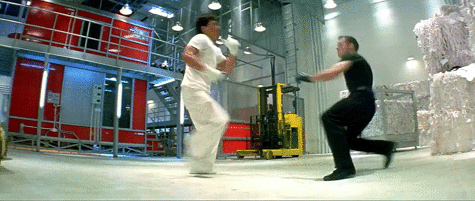
Now we meet Chan; some other Chan characters around the time had the surname Chan and two or three were even called Jackie, though here he’s only Chan in the English dub. Chi Ng is in his lavish home which also doubles as his office and his place to train, chatting with other business high-ups on monitors and asking bis butler to send a card along with a hundred roses to a woman he’s recently split up with, probably just one meaningless affair out of many, and we get the sense that Chi Ng is really a rather lonely person. Bu tracks down the message writer and sender; Hong Kong censorship no doubt forbade the use of the word “gay” so we only see him whisper it to her, though oddly enough “queer” is used later. Anyway, Alfred initially finds Bu annoying but they soon become close, Alfred filling the role of the gay best friend, not the only archetype, situation or a scene that this film borrows from American rom-coms. Bu and Chi Ng meet when she helps him out when accosted by rival Lo’s thugs in the first fight scene; her speedboat breaks down and the pair have to spend the night on a tiny island before help finally arrives. They get on, and she makes a wish even though she can’t touch her pocket while doing so because she has no pocket – but Bu’s very quick feelings don’t seem to be returned, so she decides to pretend to be this ex-mob boss’s girlfriend to get his interest. Her harebrained scheme involves getting Alfred and his friends to pretend to kidnap her. Then Long Li turns up looking for Bu and is soon to get in silly situations, while Lo decides that the best way to show Chi Ng who’s the real boss is to get a Caucasian fighter to fight a duel with him; he needs to be much lighter and better looking than Chan because it will then be funnier when Chi Ng’s beaten[!]. Perhaps more importantly though, will Chi Ng really return Bu’s affections? Will he see how valueless his rich, greedy but isolated existence is? And will he apologise to Lo; after all, it does seem that Chi Ng is in the wrong here even though Lo is playing the aggressor. Well you know the answers to all these, and the finale, in a rather long final act with several different conclusions to be gone through, contains a familiar scene which rom-com lovers will truly like.
The first fight sees Chan on a boat attacked by a few of Lo’s men. It’s hardly Dragons Forever, but the chasing and fighting sees Chan do a few trademark moves while the same fat guy is pushed into the water three times; there’s also a seriously cool bit where Chan stands on the bow and says “I’ll call you” to the lady who’s the reason for all this strife, before jumping backwards into the sea. The second fight may be shorter but is far better as Chan fends off a group of celebrity mask-wearing guys, using a stationery motorbike to aid him, then three baseballs bats without ever actually using them as they should be. But of course the highpoints are Chan’s one-on-one fights with Australian martial artist Bradley James Allan, who was apparently the only non-Chinese member of the Jackie Chan Stunt Team. He plays Allan, the fighter enlisted by Lo to fight and beat Chan. The first sees Chan controlled then beaten by Allan’s astounding melding of king fu, boxing and acrobatics. The second, a rematch which isn’t bound by rules, sees Chan learn how to defeat his opponent through a combination of discipline, endurance and random madness. Perhaps we could have done without Chan swinging him around like he does Bu earlier, not to mention as in Half A Loaf Of Kung Fu and City Hunter, and then we get a cross-eye gag which doesn’t quite work, but this is still amazing stuff, even though the fights are not at all death matches. Unlike in later films where Chan fought much younger and fasting opponents, using careful filming and cutting to try to disguise this and failing, we’re convinced when Chain wins despite some obvious wirework. In fact I love the way that both characters exhibit deep respect for each other, in an environment where practise and ability is rewarded and loved. For example, when Allan’s foot is caught in something, Chan frees it. And Chan doesn’t need to pummel his opponent until finally knocked out; both fall and it’s all about who gets up first!
For every joke that works, there’s one that doesn’t, such as the cut scene where Long is accused of looking like Chow Yun Fat and then robbed, and the much shortened gag of Bu hiding in a fridge. Depriving western viewers of seeing Stephen Chow’s cameo as a policeman may sound wrong, but Chow wasn’t at all well known in the west in 1999 and it’s not a very funny scene. Leung’s erratic performance might be far less visible in the International Cut, but viewers can still enjoy Chu’s as Lo in full. Chou has some of the funniest bits, especially when he tells his bruise-filled men off for attacking Chi Ng and saying that he’d have been worried about telling his parents if he’d got hurt, then their parents if they had. The final heart to heart between Chi Ng and Lo is possibly the best non-action scene in the film. Sadly Chan and the 22-years younger Qui don’t have the requisite romantic chemistry, and, while Chan is admirably restrained, Qi overdoes the wide-eyed innocence and kookiness and ends up being irritating, and the cut version certainly doesn’t suffer from far less Ren. But Kok and his cinematographer Man-po Cheung employ some lovely long takes, making the action seem even more impressive at times, and including some elegant steadicam work, while score composer Dan-yee Wong provides a catchy main theme which becomes a song, some very nice semi-dramatic stuff fir the big fights which goes perfectly – and a theme for Bu which is obviously copied from the main one from Ennio Morricone’s score for Cinema Paradiso. All in all Gorgeous can’t help but bring smiles in a lot of places, and contains some material that all Chan lovers should see, but doesn’t quite work in the chief way that it was clearly intended to, even if the Chan character’s transformation can’t help but melt the heart a little.
Rating: 











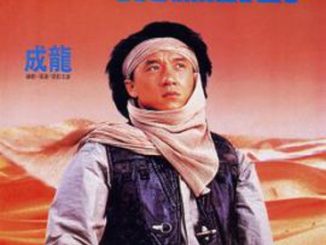
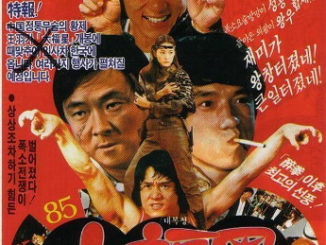

Be the first to comment